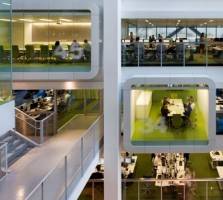May 27, 2015
Smart buildings, smart cities and the promise of infinite data
 The rapid urbanization of our world and the weaving of existing and new buildings into the urban fabric of Smart City initiatives are some of the great challenges facing our global industry today. Along with the vast amount of definitions and marketing campaigns surrounding the phrase “Smart Cities” comes the challenge of understanding why the movement is important to the Architecture, Engineering, Construction and Facility Management (AEC/FM) industry and how industry stakeholders can profit from, or at the very least, not get run over by the tsunami called Smart Cities. The emergence of Smart Cities as the conduit for ideas, thoughts, policies and strategies for the world’s urban environments is an important milestone for our industry, and it comes at a time of rapid innovation, convergence and redefinitions.
The rapid urbanization of our world and the weaving of existing and new buildings into the urban fabric of Smart City initiatives are some of the great challenges facing our global industry today. Along with the vast amount of definitions and marketing campaigns surrounding the phrase “Smart Cities” comes the challenge of understanding why the movement is important to the Architecture, Engineering, Construction and Facility Management (AEC/FM) industry and how industry stakeholders can profit from, or at the very least, not get run over by the tsunami called Smart Cities. The emergence of Smart Cities as the conduit for ideas, thoughts, policies and strategies for the world’s urban environments is an important milestone for our industry, and it comes at a time of rapid innovation, convergence and redefinitions.



























June 2, 2015
The bonds that link work with place are loosening day by day
by Paull Robathan • Comment, Flexible working, Technology, Work&Place
(more…)